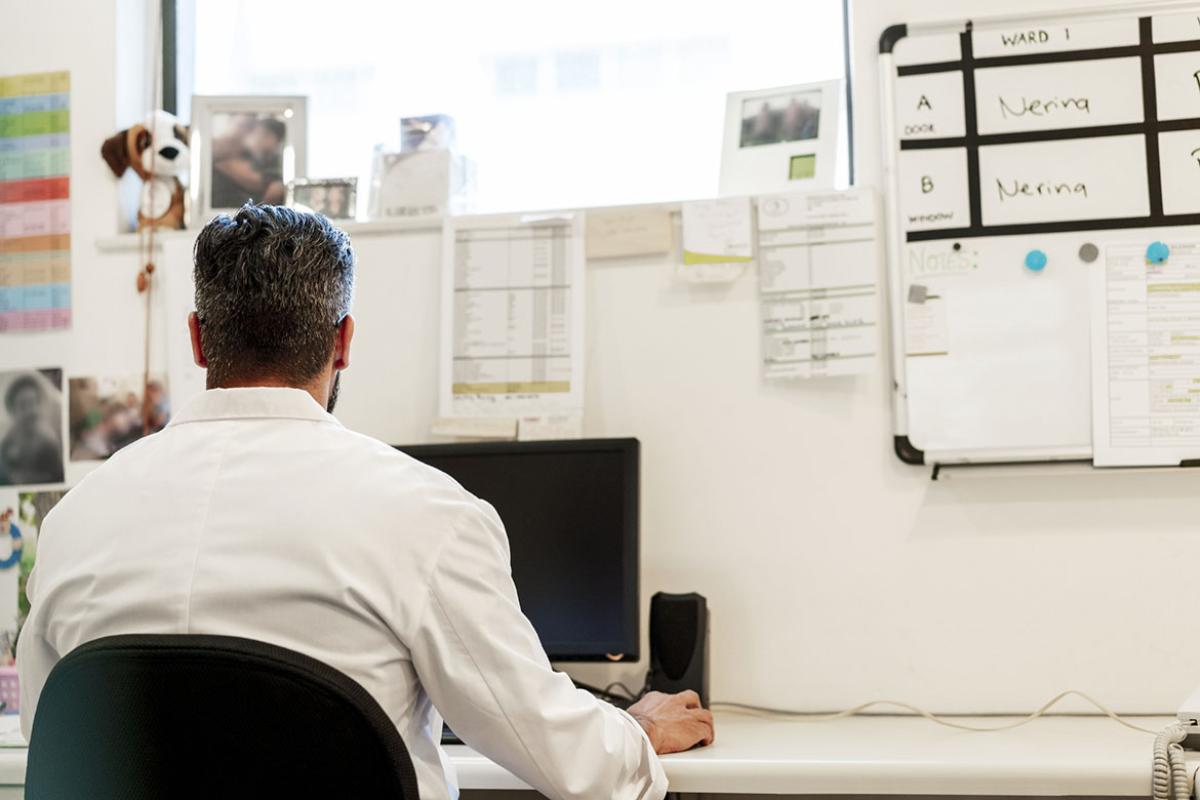Watch the AMA's daily COVID-19 update, with insights from AMA leaders and experts about the pandemic.
Featured topic and speakers
In today’s COVID-19 Update, James Campbell, MD, MS, professor of pediatrics and an infectious diseases specialist with the University of Maryland Medical Center, discusses vaccine developments related to adolescents and children, and the latest teen trials from Pfizer and Moderna.
Learn more at the AMA COVID-19 resource center.
Speakers
- James Campbell, MD, MS, infectious diseases specialist, University of Maryland Medical Center
Transcript
Unger: Hello, this is the American Medical Association's COVID-19 Update. Today, we're discussing vaccines and teens with Dr. James Campbell, professor of pediatrics and an infectious disease specialist with the University of Maryland Medical Center in Baltimore, Maryland.
Dr. Campbell, welcome back. Some good news from Pfizer last week about its trials and teens. Could you tell us what the company found and what it means?
Dr. Campbell: Sure. Thanks for having me again, Todd. So as the listeners probably know, we already have the Pfizer vaccine under emergency use authorization all the way down to the age of 16, because they included 16- and 17-year-old data in their application to the FDA for their original authorization. But there were only 150 or so in that age range lumped in with the adults. And while that was going on, they were also enrolling in a study down to age 12, so 12 through 15, and they just about a week ago now announced the results of those data, which were very encouraging.
At this point we only have the press release, so I think we have to be careful not to over-interpret, but the press release is very encouraging and that is there were about a little over 2000 children, 12 to 15-years-old, half of them got Pfizer vaccine, two doses, same dose as adults, half of them got placebo. And then they were followed to see who got infected. None, zero of the vaccinated children were infected and 18 of the placebo were recipients. So you don't need to be a statistician to do the math. It's 100% effective with those numbers, relatively small numbers, but very encouraging. So right in line with the same results that we saw in adults, a very high efficacy.
They've claimed also that the safety profile was very similar to adults, but I think we're going to need to see that to see exactly what that, quote, profile, how many sore arms and fever and missing school and that kind of thing. The other really encouraging thing is that the antibody levels. So the thing that we think is the most important correlate of protection are neutralizing antibodies against the virus. And these kids made almost twice as much antibody as their young adult compatriots. So that kind of goes along with 100% efficacy, but it's just really good news that they're making a really good immune response at the same time having no safety issues. So …
Unger: Obviously we'll need to go beyond the press release as you said before. When do you expect to see more detailed data that you're able to evaluate?
Dr. Campbell: So they've said within weeks there'll be submitting to the FDA to try to expand the authorization age range, so to allow them to move it down to 12. So I interpret within weeks to mean that we'll have it this month at some point. And typically what's happened is just before the VRBPAC, the independent group that helps FDA make decisions just before they meet, the data are released to the public. You can go onto the FDA website and see all of those details. So that would be my expectation is in the next couple of weeks, we'll all be able to see additional data.
Unger: If you think about that kind of trajectory in terms of timing, do you think that we're looking at expanding the age range in time for school in the fall?
Dr. Campbell: That's the hope is that, one, is that the Pfizer data look as good as they seem in press release. And the other company that was right behind them in very similar studies is Moderna. So as people probably remember, Pfizer came out and got emergency use authorization, and just right after that Moderna did. And Moderna did a 12- to 17-year-old study around the same time that Pfizer was doing this 12 to 15-year-old. And you would expect that those data probably could be released soon as well. So it's possible that we could have those two, the mRNA vaccines available for teenagers, for middle schoolers and high schoolers by summertime. It's not all school-aged kids, but at least it moves the needle a little bit.
Unger: You mentioned before about the antibody levels. Is that surprising to you to find the vaccine being at that level of effectiveness among this younger age group than in older folks? Is there a science to explain that?
Dr. Campbell: It's not that surprising. I mean, we always do want to confirm that young people make good vigorous immune responses, but many vaccines, especially in this teenager, young adult age range, they do really well with very good immune response. They just have vigorous responses. I mean, if you take like HPV, human papillomavirus, as an example, if you give two doses of HPV vaccine to people under the age of 15, you get multiple times the amount of antibody that you get by getting three doses to people over the age of 16 for all the serotypes. So that's why the recommendation is two doses if you start it before your 15th birthday and three doses if you start it after. Especially young, like middle school, high school, like young adults, if you will, they just have typically a really good immune response to these vaccines. And this just confirms that.
Unger: When you think about constructing vaccine trials for younger folks, either adolescent or even a younger than that, are these trials more difficult, do they have unique challenges versus the ones that we set up for adults?
Dr. Campbell: There are some unique challenges. One is consenting. It requires at that age that both the child, the teenager and their parent or guardian provide permission. And so it's parental permission plus child. What we call assent. So sort a simplified version of consent. So I think that is a tricky thing to make sure that that's done very well, that you can explain the risks and the benefits both to the parents and to the teenagers. Follow up can be somewhat tricky in that children should be in school and parents typically are working. And so coming up with a way that you can make a schedule that fits for families to be able to follow up.
Some families believe getting into these trials is you just get the shot and somehow magically then we get the data, but it doesn't work that way. The way that we get the data is they're filling out diaries on their side effect. They're coming back to have their blood drawn. We're checking in on them by telephone or in-person to examine them. So there's a lot of work involved in collecting these data. I think those are some of the challenges of doing clinical trials in kids.
Unger: And I suppose that would get even more difficult for children under 12. Do you have any thoughts on what we'll be seeing in that age group as time passes?
Dr. Campbell: Yeah. I mean, the trials will look very similar. What we probably will not see are true efficacy trials, meaning that your primary endpoint, the piece of data that you're using for your primary statistical analysis is not going to be efficacy. What it's going to be is comparing the immune responses to older kids or to adults, and then making, if you will, the leap of faith that if you make just as good an immune response, you're going to have just as good a protection. So a correlate of protection, what we call non-inferiority.
And why is that? Because those trials would have to be so huge in young children who don't get the disease as frequently for us to be able to look at efficacy. And you probably just don't need that many kids to be in the trial. So you need enough to show that there's safety and enough to show that there is an immune response that mirrors an adult immune response. Hopefully that's what we'll need to get licensure. And then the other thing is how you follow safety is slightly different in children than in adults. And one reason is they can't tell you everything.
When you get down to the young child, you can't really ask them if they have a headache or if they have muscle aches. So we changed that into are they not breastfeeding well or are they irritable? There's different ways of getting at the safety in young children. And we also want to make sure that they don't have any child-specific side effects. In other words, if high fever could lead to worse side effects or if they could have some other immune problem that an adult didn't have. We don't have a priority to believe that, but we need the data to prove that that's the case.
Unger: Now, you mentioned that in children of this age, younger children less likely to see severe cases of COVID. Is that got another side of that, which we could see vaccine hesitancy because the cases are not anticipated to be as severe? What are you seeing?
Dr. Campbell: I think every new vaccine, there's going to be some hesitancy. I think some is a good amount of hesitancy. I think families should be asking the questions of where the study is done, how well does it work, is it safe, what kind of immune response am I going to expect from my child? But then once we show those data, I think then we will be able to reduce that hesitancy. In terms of the severity of the disease in children, it is true that it's much less severe, this disease, than in adults. But if you compare COVID-19 severity to other childhood diseases, it's very severe. It's more children have died of COVID this year than have ever died in any year from influenza in the United States since we've been recording it for 17 years.
COVID right now is approximately the 10th most common cause of death for children in 2020, so it is less severe. It's the third most common cause of death for adults, but still being the 10th most common cause of death means this is not a ... It's not something that's completely benign. We have three and a half million kids diagnosed, something like 15,000 hospitalized and 279 at last count died from this. So we have a vaccine that's 95% or 100% protective, and it is safe and it's relatively easy to take with two doses.
It seems to me that we shouldn't have a huge amount of hesitancy. I think a lot of parents are going to want to take this vaccine. We just completed a nationally representative parent survey to look at what do parents think right now. And we're going to be repeating that over time as more data come out for kids. And I think what we're going to see is that it's about the same as hesitancy for other vaccines, but not something special for COVID-19. We'll be publishing that in the near future and people will be able to see the final results but, it's exciting to see that people are going to be, I think, very interested in this vaccine when we can get it to children.
Unger: It's interesting when you put it the way that you did, which is it's not an issue of severity relative to other populations with the same virus. It's how do you look at that versus the other things that folks in this age group could get. And that's a very compelling piece of data. I know that especially for young people seeing their pediatrician and getting their normal vaccines through their normal physician practices, that's an important normal way, but in this situation, at least right now, we're seeing the physician practices have been left out of the vaccine distribution for adults. Do we expect to see pediatricians being a bigger part of distribution as this usage extends to younger ages? And if not, should they be?
Dr. Campbell: Absolutely. We do see that. Each state, I think, is putting in plans for moving these vaccines out into primary care clinics, including pediatric clinics. I know that's in the plans in the state of Maryland, where I am, and I assume in the other states. And we do know, as you said, that pediatricians are very good at vaccinating the children in their practice, at talking to parents about the data and about hesitancy and all those issues. So that's the expectation is that there will be this sort of morphing from the mass vaccination, public health clinics and big stadiums and things into primary care and what we call the medical home, of course, where we think it is best. It's where there's a trusting relationship with your provider. It's where people are used to getting their vaccines. And as you said, pediatricians are really good at. And that is what's going to happen as we move down into the pediatric age range.
Unger: Well, we've seen the toll that this pandemic has had on all age groups in terms of mental health, but not surprisingly on the mental health of children, particularly teens. Do you see this vaccine rollout as being a big part of addressing that part of the pandemic?
Dr. Campbell: I do. I think, as you said, the mental health issues ... Just today I read something on there've been approximately 40,000 children in the United States that have lost a parent this year because of COVID. So we've thought about those deaths being so horrible for adults, because so many adults have died, but to think about those families, what effect that's had on the children. And the majority of those children have been teenagers. So also not being in a place like in schools, in daycares and other places where there are a lot of eyes on children, the rates of reporting of child maltreatment have gone considerably down. And it's not because fewer children are being abused or neglected. It's just because fewer people are reporting.
The number one place source of reporting for child maltreatment is in the educational system. And with kids not physically being in school, they have fewer eyes on them. So I think having children getting the opportunity to be vaccinated and to be completely back into society as they were before is just going to be good, not only to prevent them from getting COVID, but all of these other downstream epiphenomena, if you will.
Unger: It sounds like that'll be obviously a very important part of our overall efforts to get back to normalcy for everyone. Dr. Campbell, thank you so much for being with us today and sharing your perspective.
That's it for today's COVID-19 Update. We'll be back with another segment tomorrow. In the meantime, for resources on COVID-19, visit ama-assn.org/COVID-19. Thanks for joining us. Please take care.
Disclaimer: The viewpoints expressed in this video are those of the participants and/or do not necessarily reflect the views and policies of the AMA.
988 Suicide & Crisis Lifeline
With an increased number of people reporting worsening mental health in recent years, it is imperative that people are aware of the 988 Suicide & Crisis Lifeline (formerly known as the National Suicide Prevention Lifeline) telephone program.
People experiencing a suicidal, substance use, and/or mental health crisis, or any other kind of emotional distress can call, chat or text 988, and speak to trained crisis counselors. The national hotline is available 24 hours a day, 7 days a week.
The previous National Suicide Prevention Lifeline phone number (1-800-273-8255) will continue to be operational and route calls to 988 indefinitely.



